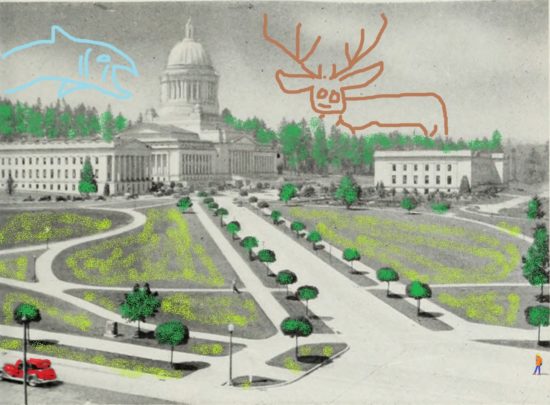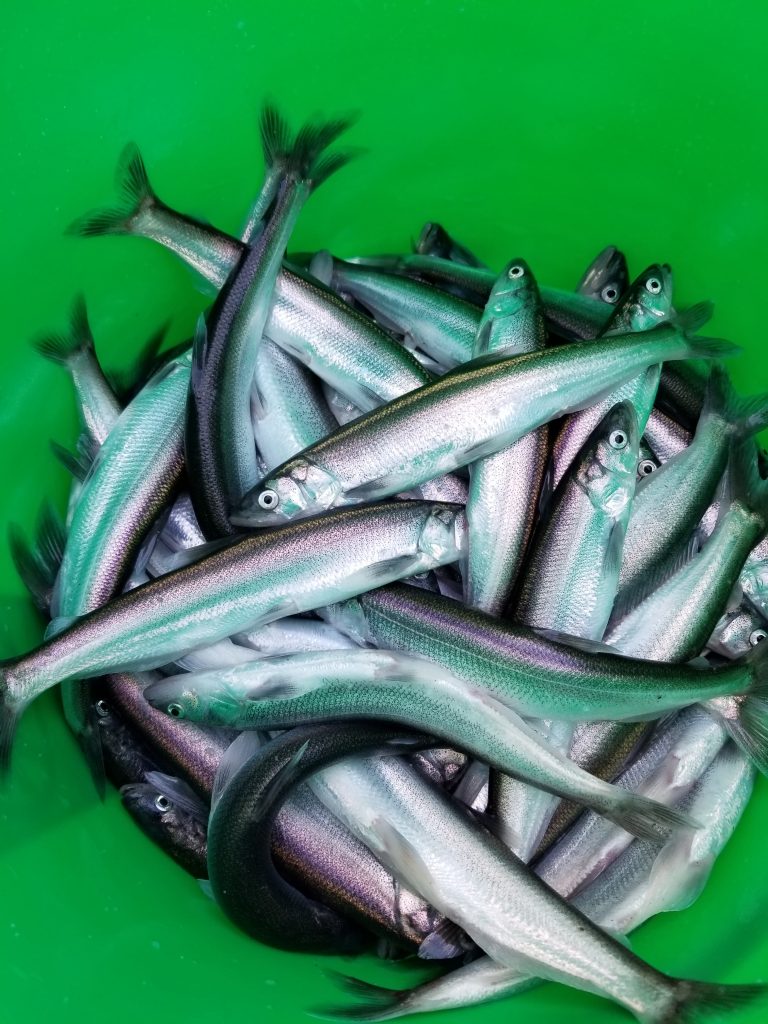
Early Look At Fish-, Wildlife-related Bills Dropped In Olympia
If it’s January, it’s time for the Olympia Outsider™ to rise from hibernation and start pawing around Washington’s seat of power for pieces of proposed fish- and wildlife-related legislation.
After a slow preseason, per se, in the form of December prefilings, this week’s gaveling in of the 2023 long session has seen lawmakers get busy as a number of bills of note have dropped in recent days.

Leading off the pack certainly is today’s Senate Bill 5297, “Concerning nontribal commercial salmon fisheries in Washington waters of the Columbia river.”
Introduced by a bipartisan collection of senators at the request of the Governor’s Office, it would ban nontribal commercial drift gillnets and drift nets in the Lower Columbia and set aside the impacts of that fishery on the Washington side “for conservation through increased wild salmonid escapement or mark selective fisheries capable of harvesting surplus hatchery-reared salmon where needed to meet federal genetic protection requirements for wild salmon populations in a manner consistent with state-tribal fishery management agreements.”
According to Wild Steelheaders United, the bill “has the potential to be a huge boost for struggling populations of wild steelhead and salmon throughout the Columbia-Snake Watershed, especially wild B-run steelhead and Spring Chinook, both of which are hovering at all-time low returns and at risk of extinction in many spawning tributaries.”
WSU says SB 5297 would also “correct (a) mistake” made by the Washington Fish and Wildlife Commission in September 2020 that allows for the possibility of the use of gillnets on the Lower Columbia in years of higher spring and summer Chinook returns.
That move was a U-turn in the longterm effort kicked off in 2012 by the states of Oregon and Washington and their commissions to phase out nontribal commercial gillnetting on the mainstem below Bonneville Dam.
The bill is cosponsored by Senator Kevin Van De Wege (D-OlyPen), chair of the Agriculture, Water, Natural Resources and Parks Committee; Sen. Jesse Salomon (D-Shoreline), committee vice chair; and Sens. Ann Rivers (R-North Vancouver), Lynda Wilson (R-East Vancouver) and Marko Liass (D-Edmonds/Mukilteo).
If passed and signed into law, it would go into effect January 1, 2025.
Judging by past attempts to ban gillnets, SB 5297 could face pretty stiff crosscurrents, and WSU tries to get out in front of one particular front, stressing that “absolutely no fishery governed by tribal co-managers is impacted at all anywhere in Washington state waters. In Washington’s waters, tribal fisheries are strictly protected by the Boldt Decision and this law doesn’t change that in any way.”
It’s important to reiterate that: It may rub you raw, but the tribes get to fish how they want to fish as part of treaties they made with the government of the United States of America. Salmon and steelhead harvest is jointly managed with the states inside that framework.
But on a closely related front, the bill does come as Governor Jay Inslee yesterday in his state of the state speech made a point of tying his proposed $1.7 billion Climate Commitment Act to salmon recovery, saying the act would allow Washington to “invest in the strongest suite of salmon recovery actions in state history. Salmon are iconic to our state, and to tribes’ cultures and way of life. This will also fund a new voluntary riparian grant program that offers landowners assistance to protect and recover these habitats statewide. Unfortunately, climate change will continue increasing the temperatures of our waters and killing salmon. Providing shade that helps cool rivers and streams is even more critical for the years to come.”
That last bit was likely a reference to SB 5266 and House Bill 1215, which would authorize and heavily fund a grant program focusing on riparian restoration. Those follow on last year’s doomed Lorraine Loomis Act that would have enforced streamside standards but never got out of committee after surprised ag interests pushed back, fearing loss of farmland.
Meanwhile, Republican-backed HB 1076 focuses on “Encouraging salmon recovery through voluntary stewardship” as cities and counties plan for growth. It has a public hearing in the House Committee on Environment & Energy tomorrow and that should spark a bill report with a fuller explanation.
But back to gillnets for a moment: Tomorrow afternoon at 1:30, Sen. Van De Wege’s committee will get a report on the nontribal gillnet license buyback program, a budget proviso passed by last year’s legislature and funded with $14.4 million to retire licenses to gillnet the Lower Columbia, Willapa Bay and Grays Harbor. According to WDFW program participation stats, it appears to have resulted in a sharp decrease in the number of active and inactive gillnet licenses as of December 1, 2022, compared to the start of the year.
Moving on to other fish and wildlife bills:
HB 1226 would require smelt dippers, carp anglers and crawfish catchers to have a recreational fishing license, which is otherwise not required right now. Sponsored by Rep. Mike Chapman (D-OlyPen), chair of the House Agriculture and Natural Resources Committee, the bill came out of WDFW, which argues, “Licenses are a gateway to knowing the rules and regulations for fisheries in Washington state. Part of the licensing process requires participants to read the annual fishing pamphlet and abide by the rules when fishing which helps maintain more orderly fisheries.”

Per the agency, last March’s smelt opener on the lower Cowlitz saw dippers on average harvest a bit over their 10-pound limit and 70 percent of those who were cited for going over that somewhat hard to define mark (often stated as “about a quarter of a 5-gallon bucket”) didn’t have a fishing license. Officers focused on the most egregious overlimits, one of which involved the stuffing of every compartment of a work truck with the oily anadromous fish.
Columbia smelt are listed as threatened under the Endangered Species Act, requiring careful management.
WDFW also says that the carp licensing exemption can give game wardens headaches: “Common carp may be taken when other fishery seasons are open. Enforcement officers have had trouble monitoring illegal salmon and steelhead fishing in certain locations – as the individual claims they were fishing for ‘carp’. Requiring a license will make that person aware of the rules for taking both carp and other fish.”
Another Chapman bill, HB 1225, addresses routine hatchery maintenance and Shoreline Management Act permitting. A WDFW-request bill, it would provide clearer direction on who needs to sign off on shoreline work around hatcheries – the agency, not local officials.
And then there’s HB 1235, which tinkers with licensing requirements, including adding a year to the definition of youth, from 15 years old to 16, and numerous other tweaks. Chapman also dropped this bill.
Speaking of Chapman, his committee this morning heard from WDFW’s legislative liaison Tom McBride, who basically gave representatives a broad overview of the agency, its commission, funding and this session’s policy-level focus – biodiversity. Last month saw Congress not advance the Recovering America’s Wildlife Act, which would have provided millions annually for mostly nongame critter conservation and management in Washington, and Governor Inslee also demurred on including a $47 million biodiversity ask in his proposed budget, so part of McBride’s mission today was to tell lawmakers that while the state department “lacks the resources necessary to track biodiversity status of fish and wildlife species of greatest conservation need and implement protection and recovery actions for these species,” now is the time to act to restore them.
Editor’s note: Let’s face it, the Olympia Outsider™ is not exactly Johnny on the spot, given the number of interstate mile markers between his home office and the home of lawmakers for the next four months, his predilection for dereliction of duty as well as an addiction to watching pirate Twitter soccer feeds, so if he’s missed any bills or other pertinent news of note from the Washington legislature, feel free to drop his boss a line at awalgamott@media-inc.com.

